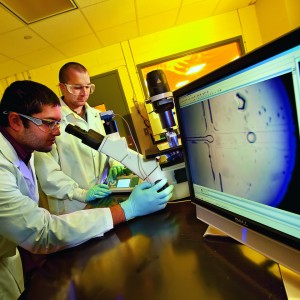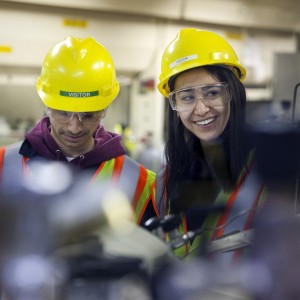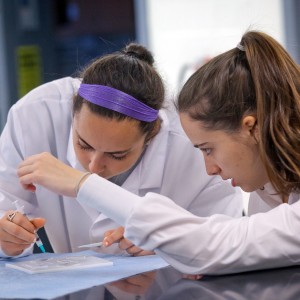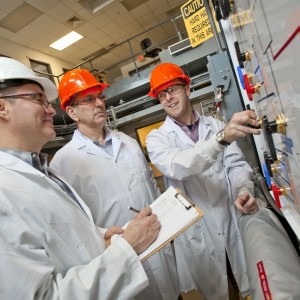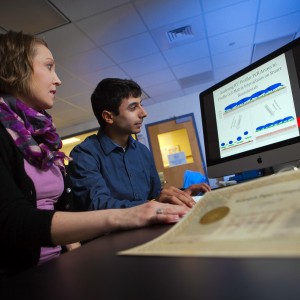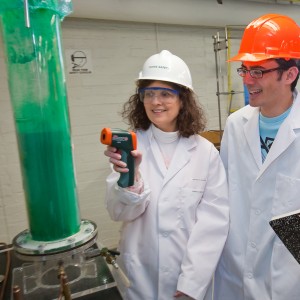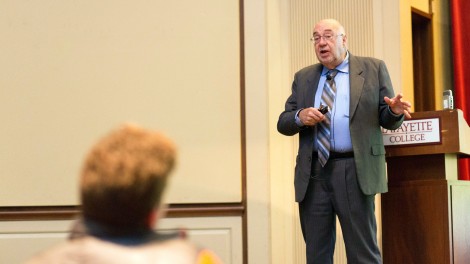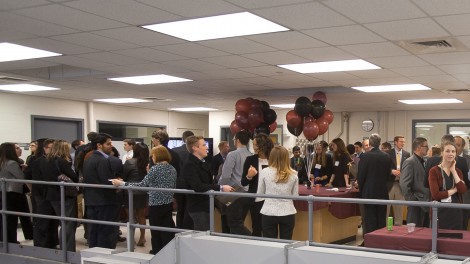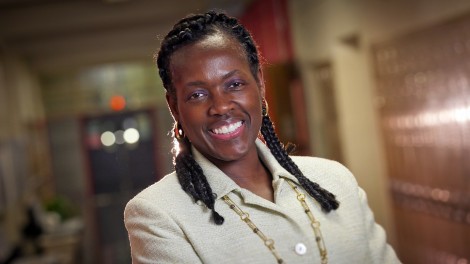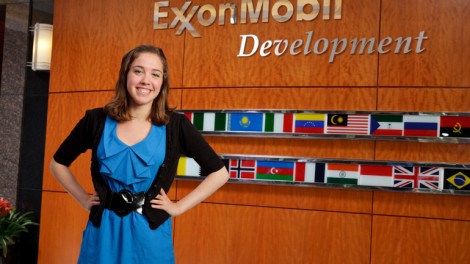Breaking Brilliant
Celebrating 100 Years of Chemical Engineering
 n the 1880s, decades before he started the chemical engineering program at Lafayette, Edward Hart was already at work building what would become its educational hallmarks, creating a family by mentoring and inspiring students to unlock the passion to solve problems involving the production or use of chemicals.
n the 1880s, decades before he started the chemical engineering program at Lafayette, Edward Hart was already at work building what would become its educational hallmarks, creating a family by mentoring and inspiring students to unlock the passion to solve problems involving the production or use of chemicals.
Chemical Engineering Through the Years
“Edward Hart built the hallmarks of our program,” says Lauren Anderson ’04, acting chair of the department. “In this centennial year, as an alumna and a faculty member, what I have found most remarkable is that the hallmarks of experiential, individualized, and hands-on learning are as important today as they were when Dr. Hart founded chemical engineering here in 1915.”
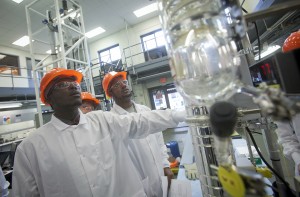
Students work with the department’s distillation plant.
Intensely collaborative and tight-knit, Lafayette’s Department of Chemical and Biomolecular Engineering is paying tribute this year to the influential patriarch who helped establish J.T. Baker Chemical Company, Allied Chemical, the Journal of Analytical Chemistry, the Journal of the American Chemical Society, and the American Institute of Chemical Engineers and wrote the first chemical engineering textbook in the United States.
Hart’s vision, passion, and entrepreneurship 100 years ago created a record of achievement and a roster of distinguished alumni who went on to become industry leaders. Under that same legacy, faculty members, students and graduates have built strong relationships at companies such as Air Products, DuPont, BASF, GlaxoSmithKline, ExxonMobil and Merck and Co. and opened opportunities for internships and employment for students.
Good chemistry across all class years
 umni and students both agree on what makes chemical engineering so unique and valuable at Lafayette – the selfless support and enthusiasm that comes from deep within the department.
umni and students both agree on what makes chemical engineering so unique and valuable at Lafayette – the selfless support and enthusiasm that comes from deep within the department.
“It was a great group of faculty and students — if you needed help you could always get it,” says Ken Tator ’63, chairman of KTA-Tator Inc. of Pittsburgh, a consulting engineering firm specializing in protective coatings and linings. “When I went to Lafayette, I wasn’t a very good student, but I had to work hard and that made a huge difference later in life.”
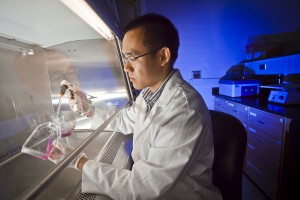
Kevin Ling ’12 works on research.
Tator says his grounding at Lafayette served him well when he took over the family business when his father died suddenly in 1969.
“I learned work discipline and enjoyed the foundation of prescribed courses for the first two years — general engineering, chemistry and organic chemistry — and then the more specific courses for chemical engineering like thermodynamics,” Tator says.
“There were long hours and times of failure,” he adds. “And wouldn’t you know, the sun came back up, and there was always someone there to help. It was a memorable experience that changed my outlook. And I applied that to the remainder of my life, even now.”
The Science of Preserving Art
- Through the IDEAL Center’s Cultural Conservation and Nanotechnology program, students learn to apply innovative methods to preserve art and cultural heritage. Headed by Professors James Ferri (chemical engineering) and Diane Ahl (art), the program includes courses in chemistry, conservation history, and art, as well as hands-on workshops. In the summer, the team trained with scientists at the Research Center for Colloids and Nanoscience (CSGI) at the University of Florence, who have pioneered cutting-edge technologies for painting conservation. Watch a video about the program.
Support, family … Shakespeare and equations
 tudents today continue to find an empowering program that’s enriched by a strong support network.
tudents today continue to find an empowering program that’s enriched by a strong support network.
“There’s a sense of family that’s been key to my education here at Lafayette,” says C. Barker Carlock ’17, who is considering a career in either the energy industry, where he’d advocate for sustainability and energy economies, or social entrepreneurship and energy policy.
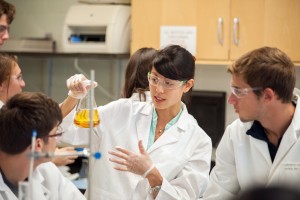
Professor Lindsey Soh teaches a course.
“Chemical engineering came to me as the best choice, and Lafayette made the most sense for me,” Carlock says. “I’m a humanities guy, far from math and science. I knew if I’d do the engineering thing, Lafayette was the only place to go, because you’ll learn Shakespeare and differential equations together.
“It takes a holistic and well-rounded educated person — a liberal arts engineer — to solve modern issues,” he says. “It’s challenging work, but the professors are always willing to have coffee with you. This is a department where it’s okay to share frustrations and struggles. My professors intuitively know how to channel me toward ways to address those struggles, and when I’m excited about an idea, they say ‘let’s do it.’”
Grads in the Industry
State-of-the-Art Connections
 ith students having full access to hands-on learning in the laboratory and more than $1.7 million of state-of the-art instrumentation and equipment, the College is staying at the forefront of undergraduate chemical engineering.
ith students having full access to hands-on learning in the laboratory and more than $1.7 million of state-of the-art instrumentation and equipment, the College is staying at the forefront of undergraduate chemical engineering.
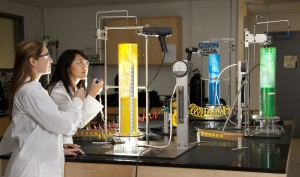 “There’s a real community in the classroom and the department as a whole. All the professors I have are more than professors to me,” says Paige Adams ’16. “They’re there for you, even outside the classroom, which is great. The students in the department are fantastic, too, and we do a lot of group activities — we bond together because of the challenges and the work we share.”
“There’s a real community in the classroom and the department as a whole. All the professors I have are more than professors to me,” says Paige Adams ’16. “They’re there for you, even outside the classroom, which is great. The students in the department are fantastic, too, and we do a lot of group activities — we bond together because of the challenges and the work we share.”
Adams says the interaction with the chemical engineering family helps her learn to work with different people and plays to her strengths and weaknesses.
“So many classes in all aspects of engineering give me a different way of thinking about solving a problem,” she says. “Lafayette is very hands on and teaches you that there’s always a solution to every problem. That mentality has shaped me as a person. I’m feeling confident going into the job market.”
Undergraduate Research
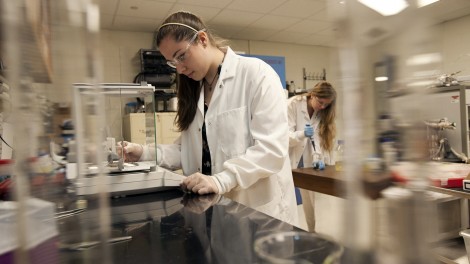
Fueling the Future
Student-faculty team works to improve performance of biodiesel.
Stephanie Roebelen ’13 agrees with that assessment.
“I feel like all the interactions with professors and their support and accessibility and the hands-on labs made the whole experience fun,” says Roebelen, who served as president of the student chapter of the American Institute of Chemical Engineers and now works at ExxonMobil as a process contact engineer, providing operational support for a refinery in Joliet, Ill.
“We have the best professor-student relationship,” she says. “From pub nights, where we’d all hang out with our professors, to one point where we did a chemistry cook-off like Iron Chef — it’s the kind of camaraderie and personal touch that Edward Hart would have been proud of.”
The next 100 years
 or a department now entering it’s second century, the solid technical foundation and supportive community of the past will continue to guide the next generation of educators and learners.
or a department now entering it’s second century, the solid technical foundation and supportive community of the past will continue to guide the next generation of educators and learners.
“What’s interesting is that we were doing these experiential and individual learning experiences and entrepreneurial thinking 100 years ago,” Anderson says. “I don’t think that will change. It has allowed us to evolve, as we did in 2008 with the expansion of the department’s title to include biomolecular engineering, and those hallmarks will be there to help us grow and train chemical engineers to solve tomorrow’s problems.”
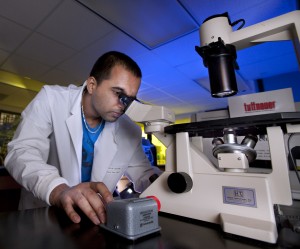
Aaditya Khanal ’12 works in the lab.
Former American Institute of Chemical Engineers President H. Scott Fogler, who gave Lafayette’s chemical engineering centennial lecture at Colton Chapel in October, may have said it best.
“You have to be proud of all that started here because of Edward Hart,” said Fogler, distinguished author, researcher, and the Ame and Catherine Vennema Professor of Chemical Engineering and the Arthur F. Thurnau Professor at the University of Michigan in Ann Arbor.
“You have a great history, a great school. There’s strength of tradition here at Lafayette, one of the earliest schools in the nation to have a chemical engineering program. You were at the forefront and continue to be at the forefront.”
